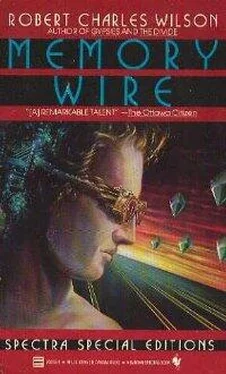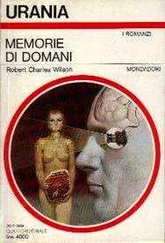Robert Wilson - Memory Wire
Здесь есть возможность читать онлайн «Robert Wilson - Memory Wire» весь текст электронной книги совершенно бесплатно (целиком полную версию без сокращений). В некоторых случаях можно слушать аудио, скачать через торрент в формате fb2 и присутствует краткое содержание. Год выпуска: 1987, ISBN: 1987, Издательство: Bantam Spectra, Жанр: Фантастика и фэнтези, на английском языке. Описание произведения, (предисловие) а так же отзывы посетителей доступны на портале библиотеки ЛибКат.
- Название:Memory Wire
- Автор:
- Издательство:Bantam Spectra
- Жанр:
- Год:1987
- ISBN:978-0-553-26853-9
- Рейтинг книги:4 / 5. Голосов: 1
-
Избранное:Добавить в избранное
- Отзывы:
-
Ваша оценка:
- 80
- 1
- 2
- 3
- 4
- 5
Memory Wire: краткое содержание, описание и аннотация
Предлагаем к чтению аннотацию, описание, краткое содержание или предисловие (зависит от того, что написал сам автор книги «Memory Wire»). Если вы не нашли необходимую информацию о книге — напишите в комментариях, мы постараемся отыскать её.
Memory Wire — читать онлайн бесплатно полную книгу (весь текст) целиком
Ниже представлен текст книги, разбитый по страницам. Система сохранения места последней прочитанной страницы, позволяет с удобством читать онлайн бесплатно книгу «Memory Wire», без необходимости каждый раз заново искать на чём Вы остановились. Поставьте закладку, и сможете в любой момент перейти на страницу, на которой закончили чтение.
Интервал:
Закладка:
He felt no loyalty to the man who had approached him through the American embassy. Oberg was his name. A man with thinning hair and a faint, obscured Texas accent; a man who looked like a schoolteacher and who was, beyond doubt, something far less pleasant. Oberg worked for the Agencies, the integrated complex of intelligence-gathering and enforcement bureaus that constituted a second and largely covert American government. Things being what they were, Oliveira owed the man a certain deference. But not loyalty.
But he felt no loyalty either to Cruz Wexler—a bourgeois cultist with highly-placed contacts in Brazil and an American’s faith in the corruptibility of foreign governments. And certainly Oliveira owed nothing to the three innocents who had appeared in his office today.
And without loyalty, Oliveira thought as he punched up Oberg’s telephone code—without loyalty there is no such thing as betrayal.
Oberg answered personally. His face was flat and oblique across the plane of Oliveira’s video screen. In the room behind him Oliveira saw a stone window, a stand of mimosa. Oberg looked at Oliveira and said simply—a soft, suppressed twang in his voice—“They’ve come, then?”
“They were here. I gave them the documents.”
“You’re certain it was them? The man and the woman?”
“They fit the description. And one other.”
Oberg seemed taken aback. “An American?”
Oliveira nodded casually and sketched out a description of Keller. Oberg scribbled notes. “I’ll want a photograph,” the Agency man said finally, “plus any information the man gave you.”
The voice commanded obedience. Oliveira was a professional subaltern, and he understood the mechanism of command. It came naturally from men like Oberg. Oberg had the look of command: even over the telephone he seemed tensed, poised to spring. If we were dogs, Oliveira thought, I would have to offer my throat to him. “Surely,” Oliveira said, performing the obeisance but resenting it, the necessity of it.
But Oberg had been surprised to hear about the third man, Keller. You are not so omniscient after all, he thought, watching as Oberg’s image faded from the CRT. You have something to learn yet.
The thought produced a flicker of satisfaction. He rang his secretary and asked for a second cafezinho.
2. Keller sat out on the walled portico of their hotel room, the evening of their last day in Brasilia, and watched the daytime traffic streaming out of the city, bureaucrats in boxlike Chinese automobiles and secretaries in crowded buses as the sun angled down toward the planalto.
After a time Teresa pushed through the beaded curtains and joined him. She had the documents in her hand, the papers they had brought back from Oliveira’s office. The name on her documents was Teresa Maria Rafael, the name they had downloaded from her black-market ID: the name her adoptive family had given her, Byron had said, in the months after the fire.
She pulled up a chair next to him. Her expression was thoughtful—had been, Keller thought, since their encounter with Oliveira. “It’s strange,” she said finally. “When you think about it. I mean, that ordinary people do this.”
Keller made a questioning noise.
“Well, it just struck me. You hear words like ‘smuggler’ and ‘criminal.’ It’s like something out of the Network nightlies. But that’s what we are, isn’t it? Smugglers and criminals.”
“In somebody’s eyes,” Keller agreed. “Does it scare you?”
“I think it does. Now that we’re here. Back in the Floats it was Wexler’s project. Wexler set it up, Wexler paid money, we were doing him a favor. Down here… it’s just us, isn’t it?” She looked away. “Oliveira scares me,” she said. “There’s something ugly about him. I don’t trust him.”
Keller waved at the sheaf of papers in her hand: “If he were trustworthy, he wouldn’t have given us these.”
“But not just him. There must be others like him. People who want to stop us.”
“The enforcement agencies,” Keller said. “The Brazilian government, at least potentially.”
She said distantly, “It’s the real world.”
“Too real.” He added, on impulse, “You can pull out, you know. It’s not too late to buy a ticket home.” He shrugged. “Maybe it would be wise.”
She stood up and leaned out from the balcony with her elbows on the railing. The last light of the day seemed to surround and contain her. She shook her head. “I’m here for a reason. And I’m not fragile.”
“You trust Wexler that much?”
She considered the question. “You don’t know him,” she said.
“Only what I’ve heard.”
“He was at Harvard for years. Did you know that? He did serious work in cryptology. He did a little contract research before the security people cut him off, so he had access to some of the first Pau Seco stones. Everybody else was plugging them into microchips, you know, downloading data. They all thought it would be this tremendous revelation… wisdom from the stars. He thought so too. But he was more fascinated with the human interface. You touch it, it makes visions. Nobody could figure out how it worked, so nobody much cared: it was ‘soft data.’ But for him it was the only thing.”
“Mysticism,” Keller said.
“He got into that,” she said, “yeah. This idea of ^wisdom. He says there’s nothing on earth we can feel or touch that’s truly alien, except the stones. The ultimate Other.”
“He made a lot of money.”
“He kept all his contacts in the government labs. The academic old-boy circuit. It’s easy for him to get stones, or copies of stones, once they’ve been downloaded. So he controls a large part of the black market up the coast. So yes, he’s made money… but I believe he’s sincere.”
Keller said, carefully neutral, “You believe what he says?”
“About the stones?” She shrugged. “I don’t know.”
“You’ve had the experience.”
“For me,” she said quietly, “it has always been more personal.” The sun was down now; the sky above the city was a darkly radiant blue. She asked, “Is that possible, Ray? That you can look into something as alien as a dreamstone—look as far and hard as you can—and find yourself looking back?”
He recalled what Byron had told him: Teresa in a shack in the Floats, trading artwork for lab enkephalins. “I’m not fragile,” she had said, but it seemed to Keller that she was: fragile and brittle as glass… except for this energy that came welling up from inside her, this restlessness.
He felt a twinge of fear for her, and that was bad: adhyasa, he thought, Angel sin. He stood up-hastily. “Tomorrow we bus to Cuiaba,” he said. “Best get some sleep.”
The stars had come out above the dark margins of the planalto.
3. But she didn’t sleep. Too much coffee, she thought, too much to think about. Instead she walked with Byron down the avenue outside the hotel, hoping to tire herself out.
Brasilia was quiet at night. She could hear the flickering buzz of the ancient potassium streetlights, the periodic rumble of a distant truck. Nobody in the streets but a few stray tourists, a few hookers poised at a public fountain. It was unreal, Teresa thought, empty, these antique white towers.
She asked Byron why he brought Keller along.
“We’ve talked about it. He knows the hinterland. A little protection …”
She said, “He’s reliable? You trust him?”
“Yes.” But his voice was more cautious.
“He’s an Angel.”
“So? I was an Angel.”
“But you changed.”
He took her arm. Overhead, in the faint light of the city, she could see the low clouds moving. Byron said, “I could have been like him. I know what it’s like for him.”
Читать дальшеИнтервал:
Закладка:
Похожие книги на «Memory Wire»
Представляем Вашему вниманию похожие книги на «Memory Wire» списком для выбора. Мы отобрали схожую по названию и смыслу литературу в надежде предоставить читателям больше вариантов отыскать новые, интересные, ещё непрочитанные произведения.
Обсуждение, отзывы о книге «Memory Wire» и просто собственные мнения читателей. Оставьте ваши комментарии, напишите, что Вы думаете о произведении, его смысле или главных героях. Укажите что конкретно понравилось, а что нет, и почему Вы так считаете.












